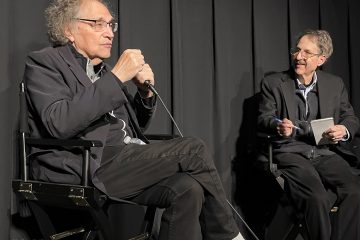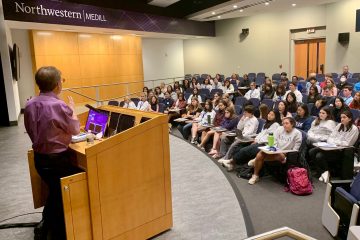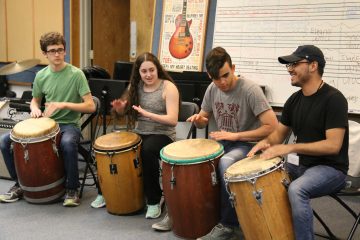“WTTW Community Conversation”: Malone and filmmakers riff on “For the Left Hand”
Documentaries spark conversation, and a lively one occurred online Oct. 27, when Sylvia Ewing spoke with “For the Left Hand” subject Norman Malone, co-director Gordon Quinn and writer/co-producer Howard Reich.
The idea was to take viewers, who can stream the film at pbs.org, deep inside the making and meaning of the feature documentary.
Watch the full conversation here:
Early on, Sylvia asked Norman how he’s handling his newfound fame.
“I’m still getting adjusted to it,” said the pianist. “It’s a surprise to me. Here I was, minding my own business, and Howard came and discovered me. And it’s a new part of my life now.”
“What made Norman’s story so special?” Sylvia asked Howard.
“I often tell people that if this film were about anybody else in similar circumstances, it would not be close to the same film,” said Howard. “Because I feel it’s who Norman is that makes this film what it is. It’s Norman’s warmth, it’s Norman’s openness, his love of music, his love of his students, it’s all reflected back. … And another thing is Norman’s incredible audacity. I mean, to play with an orchestra for the first time in your life when you’re 79 years old is a risk I have never heard of anyone else taking.”
Sylvia wondered why Gordon and co-director Leslie Simmer chose to make music itself a character in the film, which was co-produced by Diane Quon.
“That was an early idea, because music was what’s so important in Norman’s life, and it’s what he likes to talk about,” said Gordon. “With the score [which often appears onscreen], we want this film to be something that really works for people who play music. … Every time you’re looking at the music on the screen, it’s exactly what you’re hearing in the score. … And for people who don’t read music, this is not a film that’s trying to teach them how to read music. … I think we’ve shown it now to enough audiences to understand that it works for both audiences. It works for those people who read music – they’re connecting with it in a way that is very much about the music. But also for people who don’t play an instrument, it’s this incredibly powerful human story. And [it’s about] the consequences of music in somebody’s life, which is really Norman’s story.”
Sylvia got to the heart of the matter when she asked Norman how he managed to persevere in music despite many obstacles: “What was the source of your inspiration?” Sylvia asked.
“I love the music,” he said. “I love the music. It took me nine years to get out of college, because I had to work full time. … It’s never ending. It’s always something new. I had a ragtime written for me by my good friend [MacArthur “genius grant” winner Reginald Robinson]. And he wrote this beautiful ragtime, and I performed it and work on it daily. Miguel de la Cerna wrote me three jazz compositions that I’m struggling with, trying to learn. Very difficult compositions. I’m very grateful to both of them for their compositions. There’s a wealth of left-hand material. And it keeps my soul content.”
Sylvia asked Howard if there are “other hidden gems in the world like [Norman] that we just need more documentaries and more public media to bring to light?”
“Totally!” said Howard. “Norman is one story out of a zillion stories. Because Norman persevered, because he would not accept what the public school teachers told him, because he would not succumb to the psychological tests that they said defined him, because he would not give up DePaul after nine years, because of all those things we have Norman’s story. Think of all the people who have been in a bad situation who don’t have Norman’s tenacity. Those are the stories we’re losing. Those are the lives we are losing. That’s the music we’re losing. This is just the tip of that iceberg.”
Sylvia told Gordon that “one of the things that’s so inspiring for me about Norman and people like him: lifelong learning. Continuing to learn and grow. What does that mean to you as a filmmaker?”
Said Gordon, “When I was 25, I made my first film, ‘Home for Life,’ about a home for the aged. And now I’m the age of the people that I was filming when I made that film. Norman is a wonderful example. On a subconscious level, it’s one of the things that drew me to this story, was that it’s not over at 65. If you stay engaged, if you keep doing things, there’s all kinds of things that can happen. As Norman has said: He didn’t expect any of this to happen. He didn’t expect Howard to come along and give him all of this visibility and fame. But he was doing it anyway. He was doing it in his apartment. He was engaging with that music. I think that’s one of the subtexts of the film. We want to get this film out to people who deal with that issue of lifelong learning and education later in life. … We see it as a vital part of our audience.”
When Sylvia asked each panelist to name their favorite scene, Norman had the most all-encompassing answer.
“I think my life is my favorite,” he said. “My life. Yeah. It’s been an amazing journey. And I hope it still continues. Keep working. Keep learning.”
To watch the complete conversation, visit: For the Left Hand: A WTTW Preview and Community Conversation | WTTW Chicago YouTube


